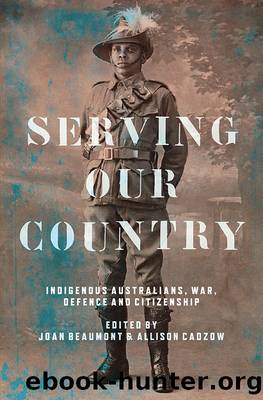Serving Our Country by Joan Beaumont

Author:Joan Beaumont
Language: eng
Format: epub
Publisher: NewSouth
Published: 2018-02-28T16:00:00+00:00
He done four tours in Vietnam. And when he came back, I donât know if this is the reason behind it, but they were marching in the streets of Sydney here, at that time when all this anti-Vietnam protests were on. And this white woman came out there and poured a whole bucket of white paint all over him [laughter] ⦠First thing he did, he went back and signed up and went back to Vietnam.51
This story is actually about anti-war protester Nadine Jensen disrupting 1RARâs welcome home parade in June 1966, and it was Minnieconâs commander whom the protester smeared with red paint and turpentine. Historians such as Ann Curthoys and Chris Dixon have written about how many Vietnam veterans have unconsciously taken this particular story and (re)constructed their own memories around it. Essentially, the story has become so dominant that it has become part of many servicemenâs own memories, and as such there is a strong mythology and collective memory of hostile encounters with the anti-war movement.52 Few testimonies explicitly recalled a positive welcome home parade; Ray Orchard said: âWe marched through Sydney and everybody said hooray.â53
(Re)constructed memories and mythologies permeate other aspects of the dominant Vietnam War narrative. Several veterans talk about returning home at night and being told to change immediately into civilian clothes so that they would not be targeted by anti-war protesters. However, as author Mark Dapin points out, planes returned at night, not to avoid protesters, but for operational reasons. Nor is there any evidence of anti-war protesters at Sydney Airport.54 Yet, veteransâ testimonies tend to dwell on reconstructed memories of confrontational protesters and the supposed mistreatment they received at their homecomings. Such examples align with Alistair Thomsonâs research about First World War veterans reconstructing their own memories of war to fit a collective memory of war and their return from it.55
Another common, though not unanimous, memory of homecoming for Indigenous veterans is that they were not welcomed in RSL branches. In some instances they were rejected for being Vietnam veterans, and in others for being Indigenous, so it is sometimes hard to separate those two intersecting identities for Indigenous veterans. A dominant narrative of Vietnam veteransâ return is that the local RSLs rejected them on the grounds that Vietnam was not a real war. In 2015 Geoff Shaw remembered one Second World War veteran telling him it could not have been a real war because there was no frontline.56 In 2014 Eric Law attributed the RSL hostility more to the fact that Australia lost the Vietnam War, and the RSLs did not want Vietnam veterans to be present as a reminder.57 Over time there was generational change at the RSLs, and nowadays most RSL leadership consists of Vietnam veterans.
In other interviews, it was Aboriginal or Torres Strait Islander veteransâ race which barred them from entering the RSLs. In 2014 Edna Coolburra told the following tale about Bill:
Download
This site does not store any files on its server. We only index and link to content provided by other sites. Please contact the content providers to delete copyright contents if any and email us, we'll remove relevant links or contents immediately.
The Memory Code by Lynne Kelly(2401)
Schindler's Ark by Thomas Keneally(1886)
Kings Cross by Louis Nowra(1797)
Burke and Wills: The triumph and tragedy of Australia's most famous explorers by Peter Fitzsimons(1427)
The Falklands War by Martin Middlebrook(1386)
1914 by Paul Ham(1345)
Code Breakers by Craig Collie(1253)
A Farewell to Ice: A Report from the Arctic by Peter Wadhams(1248)
Paradise in Chains by Diana Preston(1247)
Burke and Wills by Peter FitzSimons(1238)
Watkin Tench's 1788 by Flannery Tim; Tench Watkin;(1232)
The Secret Cold War by John Blaxland(1213)
The Protest Years by John Blaxland(1206)
THE LUMINARIES by Eleanor Catton(1196)
30 Days in Sydney by Peter Carey(1160)
Lucky 666 by Bob Drury & Tom Clavin(1155)
The Lucky Country by Donald Horne(1140)
The Land Before Avocado by Richard Glover(1119)
Not Just Black and White by Lesley Williams(1087)
